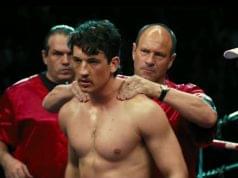I hate to keep harping on Meg Ryan, but seriously, Meg Ryan, when are you going to be in a good movie?
I feel bad for you, getting pigeonholed into the cute-and-perky roles and thereby having your obsolescence assured when you turned 40. You had to do something different after that, so you played a conflicted, extremely naked woman in “In the Cut,” a movie that was just pretentious and icky enough to make some people think it was brilliant. (They were wrong, by the way.)
Now here you are in “Against the Ropes,” the latest Meg Ryan film to center around a preposition (“In the Cut,” “Hanging Up,” “Courage Under Fire,” “Sleepless in Seattle” and “Joe Versus the Volcano” being among the others). What have you chosen to do differently here? Well, it’s the same ol’ spunky, blond Meg, the one who doesn’t swear too much, but this time, you’ve gone and taken yourself a Midwestern, “Da Bears”-style accent!
Does it sound a little silly? Well, yeah. But then, so do a lot of people who actually talk that way. So good for you, Meg, tryin’ something different! Good luck on that whole post-romantic-comedy-idol career makeover!
Unfortunately, “Against the Ropes” kinda sucks as a movie, and once again, I feel bad for adorable Meg for getting caught up in it. Written by Cheryl Edwards (“Save the Last Dance”) and directed by actor Charles S. Dutton (his big-screen debut in that capacity), it tells the sort-of true story of Jackie Kallen, the most successful female boxing promoter in history. But it does so in the least compelling, most cliché-heavy manner possible, compounding the error by making Jackie rather unlikable, too.
Jackie (played by Meg) grows up in Cincinnati watching her dad and uncle box, and now, as an adult, she works as an assistant to a fight organizer (Joe Cortese) at the Cincinnati Coliseum. She’s unappreciated by him, and even more so by LaRocca (Tony Shalhoub), a crass misogynist promoter who, like everyone else in the business, refuses to believe a woman could have anything useful to say about boxing. (The film is set in the present day, but I guess boxing is still about 50 years behind.)
After a confrontation in a bar, LaRocca gives Jackie a fighter’s contract, practically daring her to make something of him. The fighter is no good — but the thug who beats him up in his housing project has what it takes. He is Luther Shaw (Omar Epps), and Jackie convinces him to re-enter the boxing world he left years ago.
Of course, this means bringing a crusty old trainer out of retirement, too, to whip Luther into shape. Since Burgess Meredith is dead, Dutton plays the part himself. (“You’ve turned more chumps into champs than anyone,” Jackie tells him, in just one example of the film’s horrible dialogue.)
As Luther rises to success, Jackie undergoes the typical tests of loyalty and honor, making a few mistakes and becoming a rather loathsome character along the way. Her redemption at the end is not nearly enough to compensate for the egotism and bitchiness beforehand. This is especially true given that her redemption culminates in that most ridiculous of all movie clichés, the Slow Clap, including one from her theretofore enemy.
Let me give you some more of the absurd dialogue being used here. When Luther tells Jackie, “I lost my temper,” she replies. “No, you found your temper. You lost the rest of you.” (She’s not being funny, either.) Later, she encourages a young girl to pursue her dreams the way Jackie did: “Run with the big dogs. Don’t just sit on the porch and bark,” she tells her.
The boxing finale is rather well assembled, and even a little exciting; indeed, Epps’ performance in general is refreshingly charismatic. So is Ryan’s, too, up to a point. Neither of them can do much with the generic script they’re given, but at least Meg keeps her clothes on this time.
C- (1 hr., 51 min.; )





